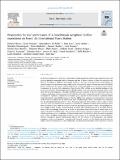Preparation for and performance of a Pseudomonas aeruginosa biofilm experiment on board the International Space Station
Author(s)
Flores, Pamela; Schauer, Rylee; McBride, Samantha A.; Luo, Jiaqi; Hoehn, Carla; Doraisingam, Shankini; Widhalm, Dean; Chadha, Jasmin; Selman, Leah; Mueller, Daniel Wyn; Floyd, Shannon; Rupert, Mark; Gorti, Sridahr; Reagan, Shawn; Varanasi, Kripa K.; Koch, Christina; Meir, Jessica U.; Muecklich, Frank; Moeller, Ralf; Stodieck, Louis; Countryman, Stefanie; Zea, Luis; ... Show more Show less
Download1-s2.0-S0094576522003526-main.pdf (9.368Mb)
Publisher with Creative Commons License
Publisher with Creative Commons License
Creative Commons Attribution
Terms of use
Metadata
Show full item recordAbstract
Biofilms are problematic on Earth due to their ability to both degrade the materials upon which they grow and promote infections. Remarkably, 65% of infections and 80% of chronic diseases on Earth are associated with biofilms. The impact of biofilms is even greater in space, as the crew's lives and mission success depend on nominal operation of mechanical systems which can be interrupted by material damage associated with biofilm growth. Furthermore, the isolated confined environment nature of spaceflight may increase the rates of disease transmission. In the case of the International Space Station (ISS), biofilms are an identified problem on the Environmental Control and Life Support System (ECLSS), namely on the water processor assembly (WPA). In late 2019, the bacterial component of the Space Biofilms experiment launched to ISS to (i) characterize the mass, thickness, morphology, and gene expression of biofilms formed in space compared to matched Earth controls, (ii) interrogate the expression of antimicrobial resistance genes, and (iii) test novel materials as potential biofilm control strategies for future ECLSS components. For this, 288 bacterial samples were prepared prior to the launch of the Northrop Grumman CRS-12 mission from NASA's Wallops Flight Facility. The samples were integrated into the spaceflight hardware, BioServe's Fluid Processing Apparatus (FPA), packed in sets of eight in Group Activation Packs (GAP). Half of these samples were activated and terminated on orbit by NASA astronauts Jessica Meir and Christina Koch, while the remaining half were processed equivalently on Earth. The spaceflight bacterial samples of Space Biofilms returned on board the SpaceX CRS-19 Dragon spacecraft in early 2020. We here describe the test campaign implemented to verify the experiment design and confirm it would enable us to achieve the project's scientific goals. This campaign ended with the Experiment Verification Test (EVT), from which we present example morphology and transcriptomic results. We describe in detail the sample preparation prior to flight, including cleaning and sterilization of the coupons of six materials (SS316, passivated-SS316, lubricant impregnated surface, catheter-grade silicone with and without a microtopography, and cellulose membrane), loading and integration of growth media, bacterial inoculum, and the fixative and preservative to enable experiment termination on orbit. Additionally, we describe the performance of the experiment on board the ISS, including crew activities, use of assets, temperature profile, and experiment timeline; all leading to a successful spaceflight experiment. Hence, this manuscript focuses on the steps implemented to ensure the experiment would be ready for spaceflight, as well as ISS and ground operations, with results presented elsewhere. The processes discussed here may serve as a guideline to teams planning their own gravitational microbiology experiments. This material is based upon work supported by the National Aeronautics and Space Administration under Grant No. 80NSSC17K0036.
Date issued
2022-10Department
Massachusetts Institute of Technology. Department of Materials Science and Engineering; Massachusetts Institute of Technology. Department of Mechanical EngineeringJournal
Acta Astronautica
Publisher
Elsevier BV
Citation
Flores, Pamela, Schauer, Rylee, McBride, Samantha A., Luo, Jiaqi, Hoehn, Carla et al. 2022. "Preparation for and performance of a Pseudomonas aeruginosa biofilm experiment on board the International Space Station." Acta Astronautica, 199.
Version: Final published version
ISSN
0094-5765